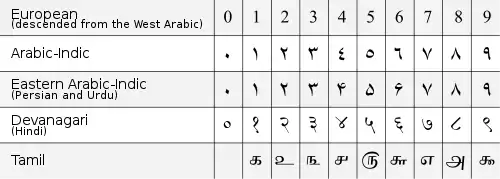The Arabic Numbers
Arabic numerals (how the numbers look) are of two types: the ones used in most of the world which originate from Arabic and those which are used in Arabic today. Notice that, while Arabic itself is written right-to-left, the numbers remain written left-to-right:
I am 42 years old today! ↔ !اليوم عندي ٤٢ سنة
A pattern you might notice is that words containing a ١ or ٢ have word-forms that differ from any pattern

Numbers ١٠-١ have no rhyme or reason, so the best thing to do is memorize them
- ١ - واحد
- wāḥid
- 1 - One
- ٢ - اثنان
- iṯnān
- 2 - Two
- ٣ - ثلاثة
- ṯalāṯa
- 3 - Three
- ٤ - أربعة
- ʾarbaʿa
- 4 - Four
- ٥ - خمسة
- ḵamsa
- 5 - Five
- ٦ - ستة
- sitta
- 6 - Six
- ٧ - سبعة
- sabʿa
- 7 - Seven
- ٨ - ثمانية
- ṯamāniya
- 8 - Eight
- ٩ - تسعة
- tisʿa
- 9 - Nine
- ١٠ - عشرة
- ʿašara
- 10 - Ten
Numbers ١٩-١١ are constructed by placing "عشر" after the number, with the exception of ١١ and ١٢ which have special word-forms. Even though these numbers are written with two separate words, they are spoken as if they are one, so ة is pronounced as ت
- ١١ - أحد عشر
- ʾāḥida ʿašr
- 11 - Eleven
- ١٢ - اثنا عشر
- iṯnā ʿašr
- 12 - Twelve
- ١٣ - ثلاثة عشر
- ṯalāṯata ʿašr
- 13 - Thrirteen
- ١٤ - أربعة عشر
- ʾarbaʿata ʿašr
- 14 - Fourteen
- ١٥ - خمسة عشر
- ḵamsata ʿašr
- 15 - Fifteen
- ١٦ - ستة عشر
- sittata ʿašr
- 16 - Sixteen
- ١٧ - سبعة عشر
- sabʿata ʿašr
- 17 - Seventeen
- ١٨ - ثمانية عشر
- ṯamāniyata ʿašr
- 18 - Eightteen
- ١٩ - تسعة عشر
- tisʿata ʿašr
- 19 - Nineteen
Numbers ending with ٠, also known as tens in English, are formed methodically by replacing ـة- with ـون-; the numbers ١٠ and ٢٠ have special forms
- ١٠ - عشرة
- ʿašara
- 10 - Ten
- ٢٠ - عشرون
- ʾišrūn
- 20 - Twenty
- ٣٠ - ثلاثون
- ṯalāṯūn
- 30 - Thrirty
- ٤٠ - أربعون
- ʾarbaʿūn
- 40 - Fourty
- ٥٠ - خمسون
- ḵamsūn
- 50 - Fifty
- ٦٠ - ستون
- sittūn
- 60 - Sixty
- ٧٠ - سبعون
- sabʿūn
- 70 -Seventy
- ٨٠ - ثمانون
- ṯamānūn
- 80 - Eighty
- ٩٠ - تسعون
- tisʿūn
- 90 Ninety
Hundreds also have their own forms, made by replacing ـة- and attaching the word for hundred to the base number, ـمائة-; the numbers ١٠٠ and ٢٠٠ have special forms
- ١٠٠ - مائة
- māʾa
- 100 - One hundred
- ٢٠٠ - مائتين
- māʾatayn
- 200 - Two hundred
- ٣٠٠ - ثلاثمائة
- ṯalāṯumāʾa
- 300 - Three hundred
- ٤٠٠ - أربعمائة
- ʾarbaʿumāʾa
- 400 - Four hundred
- ٥٠٠ - خمسمائة
- ḵamsumāʾa
- 500 - Five hundred
- ٦٠٠ - ستمائة
- sittumāʾa
- 600 - Six hundred
- ٧٠٠ - سبعمائة
- sabʿumāʾa
- 700 - Seven hundred
- ٨٠٠ - ثمانيمائة
- ṯamāniyumāʾa
- 800 - Eight hundred
- ٩٠٠ - تسعمائة
- tisʿumāʾa
- 900 - Nine hundred
Every other number under a thousand can be made placing the two words next to each other and adding the word "and", "-و", to the beginning of the next word; keep in mind that when reading numbers, the order is hundreds, ones, and then tens. Here are a few examples:
- ٢٩٥ - مائتين وخمسة وتسعون
- māʾatayn wa-ḵamsa wa-tisʿūn
- 295 - Two hundred ninety-five
- ٣٦٣ - ثلاثمائة وثلاثة وستون
- ṯalāṯumāʾa wa-ṯalāṯa wa-sittūn
- 363 - Three hundred sixty-three
- ٤٧ - سبعة وأربعون
- sabʿa wa-ʾarbaʿūn
- 47 - Fourty-seven
- ٥٠٢ - خمسمائة واثنان
- ḵamsumāʾa wa-iṯnān
- 502 - Five hundred two
- ٧٣٠ - سبعمائة وثلاثون
- sabʿumāʾa wa-ṯalāṯūn
- 730 Seven hundred thirty
- ٦١ - واحد وستون
- wāḥid wa-sittūn
- 61 - Sixty-one
- ٧١٨ - سبعمائة وثمانية عشر
- sabʿumāʾa wa-ṯamāniyata ʿašr
- 718 - Seven hundred eighteen
- ٩٩٩ - تسعمائة وتسعة وتسعون
- tisʿumāʾa wa-tisʿa wa-tisʿūn
- 999 - Nine hundred ninety-nine
- ٥٥ - خمسة وخمسون
- ḵamsa wa-ḵamsūn
- 55 - Fifty-five
- ٦٤٢ - ستمائة واثنان وأربعون
- sittumāʾa wa-iṯnān wa-ʾarbaʿūn
- 642 - Six hundred forty-two